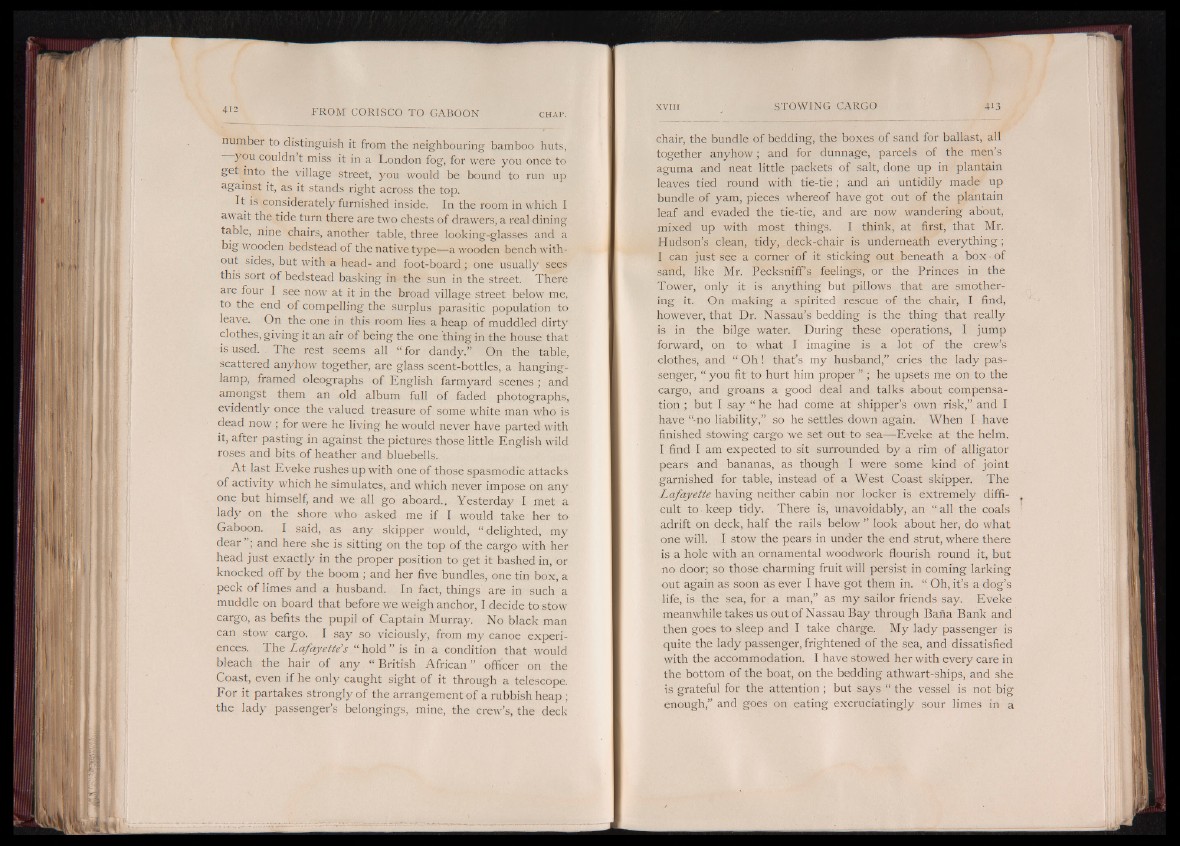
number to distinguish it from the neighbouring bamboo huts,
cou^ n t niiss it in a London fog, for were you once to
get into the village street, you would be bound to run up
against it, as it stands right across the top.
It is considerately furnished inside. In the room in which I
await the tide turn there are two chests of drawers, a real dining
table, nine chairs, another table, three looking-glasses and a
big wooden bedstead of the native type— a wooden bench without
sides, but with a head- and foot-board ; one usually sees
this sort of bedstead basking in the sun in the street. There
are four I see now at it in the broad village street below me,
to the end of compelling the surplus parasitic population to
leave. On the one in this room lies a heap of muddled dirty
clothes, giving it an air of being the one thing in the house that
is used. The rest seems all “ for dandy.” On the table,
scattered anyhow together, are glass scent-bottles, a hanging-
lamp, framed oleographs of English farmyard scenes ; and
amongst them an old album full of faded photographs,
evidently once the valued treasure of some white man who is
dead now ; for were he living he would never have parted with
it, after pasting in against the pictures those little English wild
roses and bits of heather and bluebells.
A t last Eveke rushes up with one of those spasmodic attacks
of activity which he simulates, and which never impose on any
one but himself, and we all go aboard.. Yesterday I met a
lady on the shore who asked me if I would take her to
Gaboon. I said, as any skipper would, “ delighted, my
dear” ; and here she is sitting on the top of.the cargo with her
head just exactly in the proper position to get it bashed in, or
knocked off by the boom ; and her five bundles, one tin box, a
peck of limes and a husband. In fact, things are in such a
muddle on board that before we weigh anchor, I decide to stow
cargo, as befits the pupil of Captain Murray. No black man
can stow cargo. I say so viciously, from my canoe experiences.
The Lafayette’s “ hold ” is in a condition that would
bleach the hair of any “ British African” officer on the
Coast, even if he only caught sight of it through a telescope.
For it partakes strongly of the arrangement of a rubbish heap ;
the lady passenger’s belongings, mine, the crew’s, the deck
chair, the bundle of bedding, the boxes of sand for ballast, all
together anyhow; and for dunnage, parcels of the men’s
aguma and neat little packets of salt, done up in plantain
leaves tied round with tie-tie; and an untidily made up
bundle of yam, pieces whereof have got out of the plantain
leaf and evaded the tie-tie, and are now wandering about,
mixed up with most things. I think, at first, that Mr.
Hudson’s clean, tidy, .deck-chair is underneath everything;
I can just see a corner of it sticking out beneath a box ■ of
sand, like Mr. Pecksniff’s feeling's, or the Princes in the
Tower, only it is anything but pillows that are smothering
it. On making a spirited rescue of the chair, I find,
however, that Dr. Nassau’s bedding is the thing that really
is in the bilge water. During these operations, I jump
forward, on to what I imagine is a lot of the crew’s
clothes, and “ O h ! that’s my husband,” cries the lady passenger,
“ you fit to hurt him proper ” ; he upsets me on to the
cargo, and groans a good deal and talks about compensation
; but I say “ he had come at shipper’s own risk,” and I
have “-no liability,” so he settles dowm again. When I have
finished stowing cargo we set out to sea— Eveke at the helm.
I find I am expected to sit surrounded by a rim of alligator
pears and bananas, as though I were some kind of joint
garnished for table, instead of a West Coast skipper. The
Lafayette having neither cabin nor locker is extremely difficult
to keep tidy. There is, unavoidably, an “ all the coals
adrift on deck, half the rails below ” look about her, do what
one will. I stow the pears in under the end strut, where there
is a hole with an ornamental woodwork flourish round it, but
no door; so those charming fruit will persist in coming larking
out again as soon as ever I have got them in. “ Oh, it’s a dog’s
life, is the sea, for a man,” as my sailor friends say. Eveke
meanwhile takes us out of Nassau Bay through Baña Bank and
then goes to sleep and I take charge. My lady passenger is
quite the lady passenger, frightened of the sea, and dissatisfied
with the accommodation. I have stowed her with every care in
the bottom of the boat, on the bedding athwart-ships, and she
is grateful for the attention ; but says “ the vessel is not big
enough,” and goes on eating excruciatingly sour limes in a